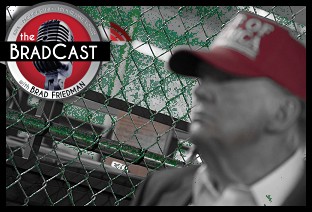 North Carolina Republicans are now seeking to delay the full federal trial challenging their massive election reform law, which has been described as the worst-in-the-nation and as a "monster" voter suppression law.
North Carolina Republicans are now seeking to delay the full federal trial challenging their massive election reform law, which has been described as the worst-in-the-nation and as a "monster" voter suppression law.
The tactic threatens to, once again, undermine any ruling by the court, should it be made too close to the state's 2016 elections. The trial in the case had previously been set, according to a timetable established in federal court in December of 2013, to take place during the July 2015 trial calendar. State Republicans, however, now argue that a separate state court challenge to one section of its massive voter suppression law, scheduled during the same period next summer, will "severely prejudice" their ability to defend themselves in the federal case which follows it.
Plaintiffs argue in response that the move is "another step in Defendants continued attempts to delay the ultimate resolution of this action."
The attempt to re-schedule comes from the same North Carolina Republicans who, this past October, successfully persuaded the U.S. Supreme Court to stay an appellate court order restoring a number of voter registration and voting provisions that were blocked by the state GOP's law, simply because the court order restoring those voting rights was issued too close to the Nov. 4, 2014 election.
The state's argument at the time was that "Court orders affecting elections...can themselves result in voter confusion and consequent incentive to remain away from the polls. As an election draws closer, that risk will increase."
The trial which the state is now attempting to stall is in response to the same federal lawsuit involving legal challenges to the state's Voter Information Verification Act ("VIVA"). This site, and many others, described the legislation as the "nation's worst voter suppression law since the Jim Crow era," when state Republicans enacted the extraordinarily wide-reaching restrictions on voting and registration in NC within days of the U.S. Supreme Court gutting a key portion of the Voting Rights Act in the summer of 2013...
In their Motion to Reschedule Trial [PDF] of the federal suit, North Carolina Republicans --- represented by both the NC Attorney General's Office and by a large private law firm --- argue that the delay is needed because there is a separate state court trial also challenging the same law scheduled for the week of July 13, 2015.
The state case they reference, Currie v. North Carolina [PDF], entails a legal challenge to VIVA's polling place Photo ID restrictions under provisions of the state constitution that treats voting as a "fundamental right." That suit alleges that between 232,502 (the low estimate made by the GOP-controlled General Assembly) and 612,955 (the estimate by the State's Board of Elections) registered voters in North Carolina lack a state-approved Photo ID and that those at risk of disenfranchisement are disproportionately poor and African American. The lead plaintiff in the case is home born, 78-year old Alberta Currie, who cannot obtain the requisite ID because she has no birth certificate.
As noted by the federal plaintiffs in their Response [PDF] to the motion to delay the trial, state Republicans, who had unsuccessfully made the same argument in order to delay the trial in state court, are now seeking a delay of a six week federal trial that, coupled with the time required to draft a post trial decision and appeals, could place voters at risk of once again being illegally disenfranchised in a Presidential election year simply because a post trial ruling would come too close to the state's March 2016 primary.
Another federal ruling, argued to have been made too close to this year's midterm election, was the basis for a U.S. Supreme Court stay of a permanent injunction issued in response to a "deliberately discriminatory" Texas Photo ID law passed by Republicans in that state. The law was found to result in the potential disenfranchisement of some 600,000 disproportionately minority and poor, but otherwise lawfully registered voters. The Court's decision, temporarily setting aside the lower court's ruling, was made simply on the basis that the injunction was handed down too close to the election.
Similarly, in North Carolina itself, a ruling by the 4th U.S. Circuit Court of Appeal to restore same-day registration and the counting out of ballots cast in the wrong precinct --- both restrictions that are part of VIVA --- was vacated by the U.S. Supreme Court on the basis that it, too, was issued too close to the start of this year's mid-term election.
Defendants argue that even if the different state and federal trial dates don't immediately overlap, they "will be severely prejudiced by having two trials of this magnitude and complexity scheduled during the same six-week period."
The federal plaintiffs describe the argument as "simply not credible."
"If the state demanded three months in between trials in which it was being sued, no litigation challenging state laws would ever be resolved in a timely fashion," the plaintiffs argue in response to the motion. "In any area of law, attorneys may have matters that are scheduled to go to trial in close proximity. The wheels of justice cannot grind to a near halt because attorneys might need to work long hours."
They add that, with two large firms --- the state AG's office and Ogletree Deakins, a huge private firm that maintains offices in more than 40 cities throughout the nation, plus offices in Berlin and London --- representing the state, "It would be a discredit to both institutions to believe they cannot manage both cases." Plaintiffs go on to call the motion "unsupportable" and "paint[ing] a deeply disingenuous picture of the state proceedings."
The GOP's legal tactic, unfortunately, does not come as a surprise.
As we observed when we described the SCOTUS ruling in the Texas photo ID case this past October as a "another dark day for democracy," in applying the Supreme Court's per se rule to any injunction issued "too close" to an election, the Court has established a precedent "that no matter how egregiously and purposefully racist a voter suppression scheme may be, those who seek to reinstate Jim Crow at the polls will always get at least one chance to insure a tainted election, simply by running out the clock on well-taken legal challenges."
What we see in this case appears to be an effort by North Carolina's Republicans to stretch the per se rule from one election to the next, and potentially insure yet another tainted election in the Tar Heel State.
UPDATE: Dec. 9, 2014: Observing that the current trial setting had been in place "for nearly a year," U.S. Magistrate Judge Joi Elizabeth Peake issued an Order [PDF] denying the motion to reschedule the trial which had been filed by North Carolina Republicans.
- With additional reporting by Brad Friedman.
(Snail mail support to "Brad Friedman, 7095 Hollywood Blvd., #594 Los Angeles, CA 90028" always welcome too!)
|


 Repub Support for Immigrants Skyrockets Amid Trump's Crackdown: 'BradCast' 7/14/25
Repub Support for Immigrants Skyrockets Amid Trump's Crackdown: 'BradCast' 7/14/25  Sunday 'Totally Predictable' Toons
Sunday 'Totally Predictable' Toons Democracy STILL Our Best Way Out of This Mess -- And Repubs Know It: 'BradCast' 7/10/25
Democracy STILL Our Best Way Out of This Mess -- And Repubs Know It: 'BradCast' 7/10/25 'Green News Report' 7/10/25
'Green News Report' 7/10/25
 'Mass Shooter Subsidy'?: More Dumb, Deadly Stuff in Trump's New Law: 'BradCast' 7/9/25
'Mass Shooter Subsidy'?: More Dumb, Deadly Stuff in Trump's New Law: 'BradCast' 7/9/25  Trump's New Law Supersizes ICE, Mass Detention, Militarization: 'BradCast' 7/8/25
Trump's New Law Supersizes ICE, Mass Detention, Militarization: 'BradCast' 7/8/25  'Green News Report' 7/8/25
'Green News Report' 7/8/25 Texas Flooding Tragedy Was Both Predictable and Predicted: 'BradCast' 7/7/25
Texas Flooding Tragedy Was Both Predictable and Predicted: 'BradCast' 7/7/25 Sunday 'Big Billionaire Bonanza' Toons
Sunday 'Big Billionaire Bonanza' Toons Sunday 'Total Obliteration' Toons
Sunday 'Total Obliteration' Toons 'Green News Report' 6/26/25
'Green News Report' 6/26/25 Thank You For Your Attention to This Matter:
Thank You For Your Attention to This Matter: Mamdani Primary 'Win' Augurs New Era of Rising Progressives: 'BradCast' 6/25/25
Mamdani Primary 'Win' Augurs New Era of Rising Progressives: 'BradCast' 6/25/25 U.S. Authoritarianism Under-way (But We're Still Here to Fight It): 'BradCast' 6/24/25
U.S. Authoritarianism Under-way (But We're Still Here to Fight It): 'BradCast' 6/24/25 'Anti-War' Trump Attacks Iran on False Claims About WMD: 'BradCast' 6/23/25
'Anti-War' Trump Attacks Iran on False Claims About WMD: 'BradCast' 6/23/25 Senate Health Care Cuts 'More Extreme' Than House Version: 'BradCast' 6/19/25
Senate Health Care Cuts 'More Extreme' Than House Version: 'BradCast' 6/19/25 What 'Anti-War President'? MAGA Civil War Over Trump, Iran: 'BradCast' 6/18/25
What 'Anti-War President'? MAGA Civil War Over Trump, Iran: 'BradCast' 6/18/25 Trump's 'Remigration' is Code for 'Ethnic Cleansing': 'BradCast' 6/17/25
Trump's 'Remigration' is Code for 'Ethnic Cleansing': 'BradCast' 6/17/25 Last Weekend Today: 'BradCast' 6/16/25
Last Weekend Today: 'BradCast' 6/16/25
 VA GOP VOTER REG FRAUDSTER OFF HOOK
VA GOP VOTER REG FRAUDSTER OFF HOOK Criminal GOP Voter Registration Fraud Probe Expanding in VA
Criminal GOP Voter Registration Fraud Probe Expanding in VA DOJ PROBE SOUGHT AFTER VA ARREST
DOJ PROBE SOUGHT AFTER VA ARREST Arrest in VA: GOP Voter Reg Scandal Widens
Arrest in VA: GOP Voter Reg Scandal Widens ALL TOGETHER: ROVE, SPROUL, KOCHS, RNC
ALL TOGETHER: ROVE, SPROUL, KOCHS, RNC LATimes: RNC's 'Fired' Sproul Working for Repubs in 'as Many as 30 States'
LATimes: RNC's 'Fired' Sproul Working for Repubs in 'as Many as 30 States' 'Fired' Sproul Group 'Cloned', Still Working for Republicans in At Least 10 States
'Fired' Sproul Group 'Cloned', Still Working for Republicans in At Least 10 States FINALLY: FOX ON GOP REG FRAUD SCANDAL
FINALLY: FOX ON GOP REG FRAUD SCANDAL COLORADO FOLLOWS FLORIDA WITH GOP CRIMINAL INVESTIGATION
COLORADO FOLLOWS FLORIDA WITH GOP CRIMINAL INVESTIGATION CRIMINAL PROBE LAUNCHED INTO GOP VOTER REGISTRATION FRAUD SCANDAL IN FL
CRIMINAL PROBE LAUNCHED INTO GOP VOTER REGISTRATION FRAUD SCANDAL IN FL Brad Breaks PA Photo ID & GOP Registration Fraud Scandal News on Hartmann TV
Brad Breaks PA Photo ID & GOP Registration Fraud Scandal News on Hartmann TV  CAUGHT ON TAPE: COORDINATED NATIONWIDE GOP VOTER REG SCAM
CAUGHT ON TAPE: COORDINATED NATIONWIDE GOP VOTER REG SCAM CRIMINAL ELECTION FRAUD COMPLAINT FILED AGAINST GOP 'FRAUD' FIRM
CRIMINAL ELECTION FRAUD COMPLAINT FILED AGAINST GOP 'FRAUD' FIRM RICK SCOTT GETS ROLLED IN GOP REGISTRATION FRAUD SCANDAL
RICK SCOTT GETS ROLLED IN GOP REGISTRATION FRAUD SCANDAL VIDEO: Brad Breaks GOP Reg Fraud Scandal on Hartmann TV
VIDEO: Brad Breaks GOP Reg Fraud Scandal on Hartmann TV RNC FIRES NATIONAL VOTER REGISTRATION FIRM FOR FRAUD
RNC FIRES NATIONAL VOTER REGISTRATION FIRM FOR FRAUD EXCLUSIVE: Intvw w/ FL Official Who First Discovered GOP Reg Fraud
EXCLUSIVE: Intvw w/ FL Official Who First Discovered GOP Reg Fraud GOP REGISTRATION FRAUD FOUND IN FL
GOP REGISTRATION FRAUD FOUND IN FL

































